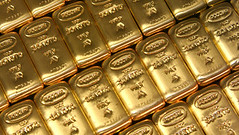 |
| gold (Photo credit: Financial Georgia) |
Macedonia’s gold and silver mines are once again making headlines. Whoever would have thought that King Phillip II of Macedonia had exhausted the mines that became part of his kingdom after conquering Thrace and Chalcidice is entirely wrong. We know that in 357 BC Philip watched the Chalcidice very closely since it thanked its economic importance to the mines of Crenides, just above the port of Neapolis (today’s Kavala), a valuable naval base in the region. Philip marched in and defeated the Thracian forces. He was determined to stay and in order to put his stamp on this place he changed the name of Crenides to Philippi. These newly acquired mines provided Philip with a reliable and steady inflow of money, Crenides being the largest and most profitable mine. By 356 BC money was flowing in steadily from these recently acquired mines and it is said they yielded more than 1,000 talents a year, more than enough to cover his military expenses and provide regular pay to his soldiers.
At about the same time, Philip had kicked out the Athenians from the Chalcidice where they had established settlements at Potidaea (on the neck of the Cassandra peninsula), close to Olynthus, and fought with them over Amphipolis on the trading route with Thrace, including abovementioned mines of Crenides. In the process, Philip obtained control over the mines of Stratonici, Skouries and Olympiade on the east side of the Chalcidice peninsula.
The Chalcidice is one of the most beautiful regions of Greece, least spoiled by tourism and rich with forests of oak, beech and pine and a main producer of wine, honey and olive oil. This is exactly where today’s big mining companies face each other to bring them back into production.
Canadian Eldorado Gold and Australian Glory Resources want to turn Greece into the biggest producer of these precious metals by 2016. A very ambitious and controversial project in a country desperately needing fresh currency. The projects are not exactly new but until now they were stopped by environmentalists because of the inevitable pollution, especially in the case of gold mining. Yet, in a region where unemployment hits 25% of the population it is understandable that conflicts between opposing parties arise. The companies promise to create 1,500 new jobs but local environmentalists argue that their present jobs will become obsolete: fishermen, beekeepers, lumberjacks, all those working in the woods and in the tourist sector will be hit.
What disturbs me personally is to read for instance that the contract between the Greek state and Eldorado’s subsidiary Hellas Gold stipulates that they are not liable for any “historic environment liabilities”. Is nobody paying attention to the consequence for our heritage, I wonder? As always, politics and money are the winners. In this homeland of Aristotle, plans are being drawn to create an open pit mine of approximately 700 metres in diameter together with a subterranean mine, and the first trees have been felled already. By 2016 the combined locations of Skouries, Olympias and Stratoni are expected to produce about 345,000 ounces of gold.
Another “hot-spot” is the Sapes mines located northwest of Alexandroupolis in today’s province of Thrace, also once actively exploited by King Philip, which is expected to have an annual output of about 80,000 ounces of gold. In this area also, 24% of the population is without a job; together with the other three mining sites mentioned above, these rates are higher than Greece’s average.
But there is still another factor to consider, and that is how much profit these enterprises will yield to the Greek treasury. Glory, for instance, based on the current estimated lifetime of the project will pay about $80 million in taxes and approximately $22 million in royalties. However, there is no law regulating taxes on royalties from the mining activities in Greece and in the end, the gross of the profits will not end up with the Greeks themselves.
Gold miners predict Greece could soon be the biggest European producer. Yes, could be, but will it work to boost the economy? (makedonia-alexandros)




